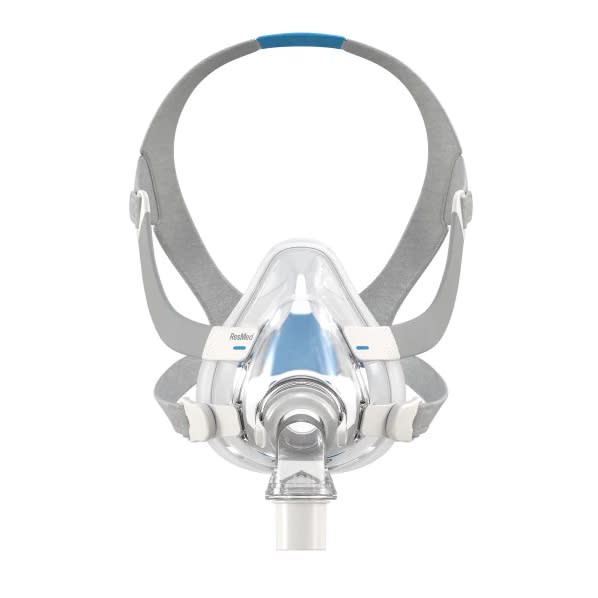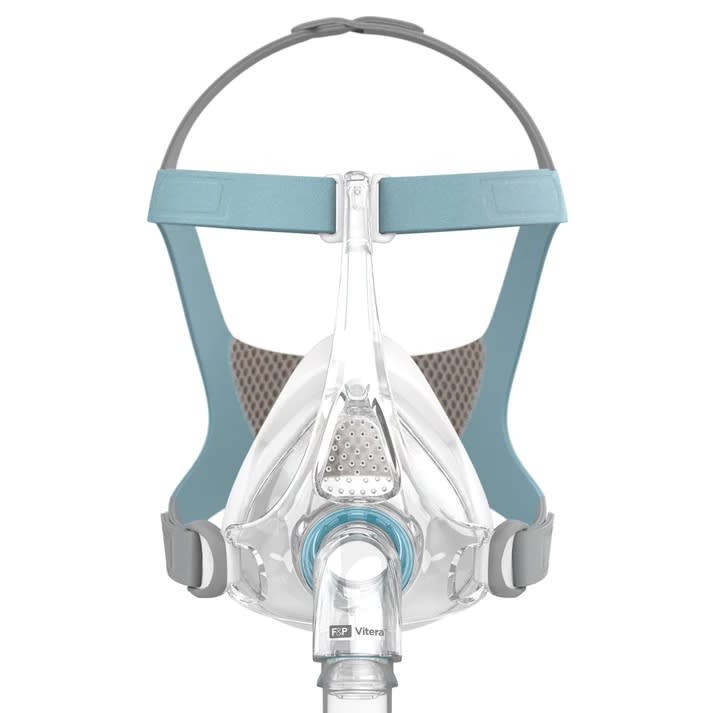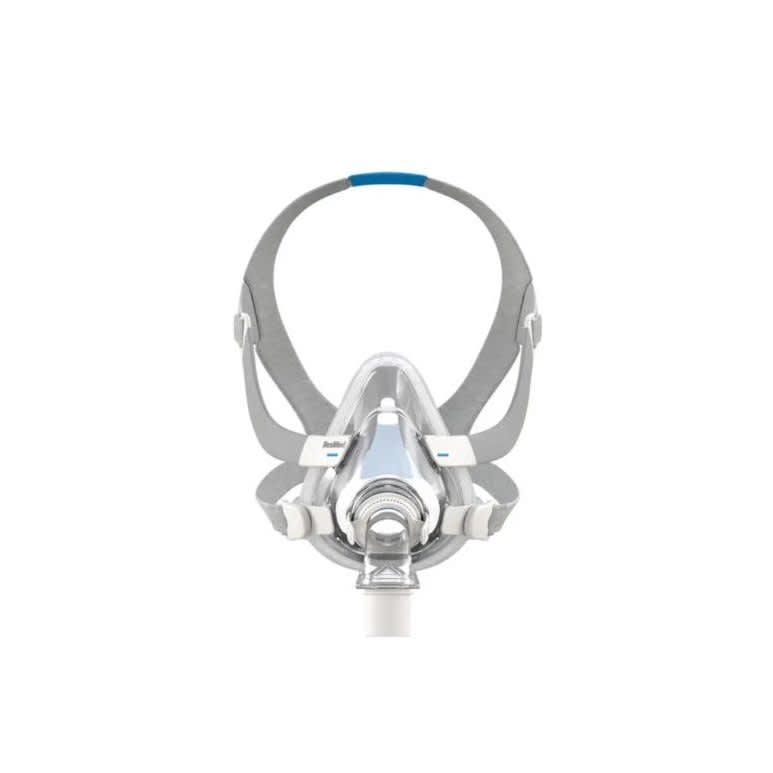On This Page
The Best CPAP Masks for Mouth Breathers
Our Top Picks
-
Best Overall
ResMed AirFit F20 Full Face CPAP Mask -
Best for Active Sleepers
Fisher & Paykel Vitera Full Face CPAP Mask with Headgear -
Best Memory Foam
ResMed AirTouch F20 Full Face CPAP Mask with Headgear
Best Overall

The ResMed AirFit F20 Full Face CPAP Mask is designed to fit a wide variety of face sizes and shapes.
Pros & Cons
Pros
- InfinitySeal cushions engineered to provide a better seal around the nose
- Quiet airflow
- Ergonomic design with space for glasses and a ponytail
Cons
- For Her version only available in small or medium sizes
- Magnets may cause unsafe interactions with pacemakers and implanted medical devices
Full Details
Best for Active Sleepers

The Fisher & Paykel Vitera Full Face Mask includes a stability bar that runs from the forehead to the mouth, adding extra contact points to prevent unintentional mask leaks.
Pros & Cons
Pros
- Stability bar and adaptable nasal bridge designed to reduce air leaks
- Breathable mesh headgear cover
- F&P myMask App helps guide mask setup and cleaning
Cons
- Stability bar may feel restrictive
- Elbow cannot be removed from frame
Full Details
Best Memory Foam

Made with contouring memory foam and featuring a quick-release elbow as well as magnetic clips, the ResMed AirTouch F20 Full Face CPAP Mask is designed for comfort and ease of use.
Pros & Cons
Pros
- Sleek and unobtrusive profile covers the mouth and nose
- Quick-release elbow allows mobility without taking off the mask
- Memory foam adapts its shape to individual users
Cons
- Mask cushions can’t get wet and need replacing monthly
- Lavender option not available in large size
- Mask contains magnets, which may not be compatible with implanted devices such as pacemakers
Full Details
How We Make Our Picks
When we review CPAP machines and accessories, we use our team’s decades of medical and sleep health experience. The best CPAP masks for mouth breathers are models that we’ve vetted for compatibility, effectiveness, and comfort. We use real verified reviews, peer-reviewed data, and health professionals’ recommendations to determine whether or not to promote a model to our readers. For this review, we relied specifically on user data from people who breathe through their mouths, considering what they thought of a model during practical use.
What is the Best Type of CPAP Mask for Mouth Breathing?
If you breathe through your mouth while sleeping, you’ll probably find that a full-face CPAP mask works best. With a nasal mask, the air delivered by the CPAP machine can escape through your mouth instead of working to keep your airway open. A full-face mask is typically better at preventing leaks when mouth breathing.
Experts do recommend giving nasal masks a try, as research shows they’re generally more effective and many people naturally transition to nose breathing after starting CPAP therapy.
A chin strap can reduce air leaks from mouth breathing while using a nasal mask. If nasal congestion makes it difficult to breathe through your nose, ask your doctor about nasal sprays, nasal strips and dilators, antihistamines, or a humidifier.
| Mask Type | Description | Benefits | Drawbacks |
| Full-Face Mask | A full-face mask covers the mouth and nose. This design minimizes air leaks from the mouth and ensures that the CPAP airflow reaches the airway. |
|
|
| Nasal Mask | Most nasal masks run from the bridge of the nose to just above the mouth, though some nasal cradle models rest beneath the nose and seal against the nostrils. |
|
|
| Nasal Pillow Mask | Nasal pillow masks are more minimalist than nasal masks, with soft inserts that seal just inside the nostrils. |
|
|
We often recommend full-face masks to people who breathe through their mouths because they’re less likely to leak. Some people find their large size uncomfortable, but memory foam cushions and mask liners can help.
Where Can You Buy a CPAP Mask for Mouth Breathing?
CPAP masks are sold online and in physical stores. You may also be able to purchase a mask through your doctor or sleep specialist. Regardless of where you buy the mask, you’ll need a prescription.
Sleep specialists and brick-and-mortar medical supply stores have trained staff who can offer advice on purchases. These sellers are also more likely to accept insurance. By contrast, online retailers may offer a larger selection and better prices, but they are less likely to work with insurance companies.
How to Choose a CPAP Mask if You Breathe Through Your Mouth
When choosing a CPAP mask for mouth breathing, look for one that fits comfortably and is compatible with your CPAP machine. You should also consider personal factors like sleeping position, budget, and whether you feel comfortable wearing a chin strap.
| Size and Fit | A comfortable, well-fitting CPAP mask reduces unintentional air leaks and helps ensure you’re getting the most effective CPAP treatment. Each model has a slightly different design, so finding the right fit may involve some trial and error. |
| Chin Strap | A CPAP chin strap can help keep your mouth closed and prevent unwanted mouth leaks. You may need to switch to a full-face mask if you have significant nasal congestion, if air leaks continue after adding a chin strap, or if you find the chin strap uncomfortable. |
| Sleeping Position | Full-face masks work best for mouth breathing. However, these masks may cause unintentional mask leak for side and stomach sleepers. Some companies offer lower-profile full-face masks that are less restrictive. If you can’t sleep on your back, another alternative is to buy a nasal mask and add a chin strap. |
| Device Compatibility | CPAP mask manufacturers generally provide information about device compatibility. Depending on the manufacturer, you may need to purchase a mask from the same company that makes your CPAP machine. Check the specifications to confirm the mask works with your required pressure settings. |
| Price | Masks are a separate purchase on top of the cost of a CPAP machine, although they’re often covered by insurance. Full-face CPAP masks generally cost between $60 and $200, nasal masks between $50 and $175, and nasal pillow masks between $70 and $120. Replacement mask cushions typically run between $20 and $60. |
Your sleeping position factors into what kind of mask you should get. Full-face masks can shift if you sleep on your side, so if that’s your preferred sleeping position and you breathe through your mouth, you may want to think about a nasal pillow and chin strap combination.
Is a Prescription Required for a CPAP Mask?
Although CPAP masks are purchased separately from the CPAP machine, you need a prescription to purchase the mask as well. Retailers usually ask for a copy of the prescription before selling the mask. Mask replacement parts, including cushions and headgear, are available without a prescription.
Does Health Insurance Cover the Cost of a CPAP Mask?
As part of CPAP therapy, the cost of purchasing a CPAP mask is at least partially covered by Medicare, Medicaid, and many private insurance plans. Note that many insurers have specific CPAP compliance requirements. For example, to remain eligible for Medicare coverage, you must demonstrate that the CPAP machine is helping you and that you use the device at least four hours per night on 70% of nights.
Frequently Asked Questions
While it’s possible to use a nasal CPAP mask if you breathe through your mouth, most people find full-face models to be the best CPAP mask type for mouth breathing. Nasal masks may be more susceptible to air leaks in this situation, particularly if you have a blocked or stuffy nose.
A chin strap can help anchor your mouth shut when using a nasal CPAP mask. Nasal strips or sprays can also clear up congestion, making the nose easier to breathe through. Taping your mouth shut is another option, but talk to your doctor first. If you’re using a full-face mask, it’s not necessary to keep your mouth closed.
